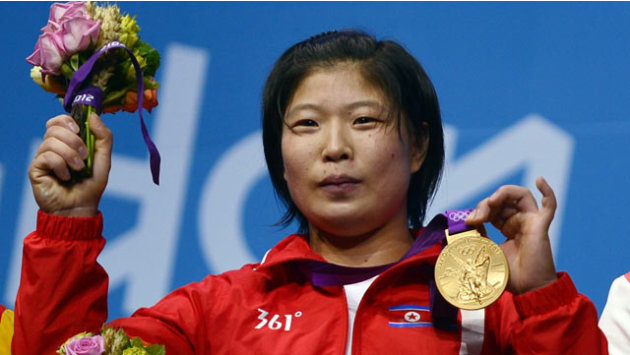North Korea's Key to Olympic Medals: Refrigerators For Winners, Labor Camp Threat for Losers

North
Korea's Olympic athletes are thrilling their countrymen with surprising success
in winning medals and they are attributing their success to their Dear Leader Kim
Jong Un.
But others,
including former North Korean athletes who have defected, suggest the success
of the country's small contingent of athletes at the games may be the result of
a policy of training them from a very young age at specialized schools, backed
up by rewards like cars and refrigerators for winners and the threat of labor
camps for losers.
North Korea
ranks 14th in the overall medal count, but fifth in terms of the number of gold
medals with four.
The country
won two golds in men's weightlifting, one in women's weightlifting and one in
women's judo. It also captured a bronze medal in women's weightlifting.
The
communist nation has 56 athletes competing in 11 sports. Its hopes for
additional medals lie in boxing, wrestling, diving, table tennis, judo, and
archery. The best Olympic result in the past was four gold medals and five
bronzes in Barcelona 1992.
Joyful
residents in North Korea gather to watch the games on huge outdoor screens and
public places with television connection.
"After
witnessing the gold medal at the Olympics, my heart is unutterably happy and my
pride (in our nation) is growing," an unidentified woman said on state
television news.
That pride
is exactly what the country's new 28 year-old leader Kim Jong Un is looking
for. He has taken control of the impoverished nation of 25 million after his
father Kim Jong Il passed away last December. Decades of famine have left many
North Koreans bitter and analysts say this Olympic Games' fever is a perfect
opportunity to generate loyalty and devotion among his subjects.
Gold
medalist Kim Un-Guk, who set an Olympic record in 62-kilogram weightlifting,
dutifully attributed his triumph to their leader Kim Jong Un.
"I won
first place because the shining Supreme Commander Kim Jong Un gave me power and
courage," he told reporters in London.
An Kum-Ae,
who won her gold in the women's judo 52-kilogram division, said, "I cannot
be any happier than right now for I can give my gold medal to our great leader,
Kim Jong Un."
Woo-Young
Lee, a professor at University of North Korean Studies in Seoul, says,
"Athletes in North Korean society are revered as elites and they are
managed, trained, and supported on a national level."
Hand-picked
by the Communist Party's Sports Committee, the athletes are trained at very
young ages and registered at specialized schools which provide "daily
meals and spending money at times," said Gu-Kyeong Bang, a defector living
in South Korea.
Secret to North Korea's Olympic Success
Bang was a
student athlete in Taewondo in the North. Training involved four hours of
"ideological education" per week aimed at cultivating loyalty to the
leader.
"They
play with a different mind set," said another North Korean defector to the
South, Kim Yo-Han. "An absolute loyalty towards the country and the leader
is the core foundation of the North Korean athletes' sportsmanship."
Kim's father
was a soccer coach and mother was a rhythmic gymnastics coach in the North.
Upon
returning home, gold medal athletes like Kim Un-Guk and An Gum-Ae would be
rewarded with handsome prize money, an apartment, a car, and additional perks
like refrigerators and television sets.
But most of
all, they will be rewarded with a huge jump in social status with the title of
"hero" or "people's athlete."
But poor
performances, especially losing to their archenemy nations like the United
States or South Korea, have consequences. Rumors of athletes being sent
directly to labor camps upon arriving home are not confirmed, but it is a
common procedure to open "review meetings" after the sports events in
which participants "assess" their own and each other's games, said
Kim Yo-Han.
If during
that process the person is determined "disloyal" to their Dear
Leader, the athlete is likely to be expelled from the sports organization and
at times sent to labor camps.
Yunjoo Lim
and Sungeun Lee contributed to this report
No comments:
Post a Comment